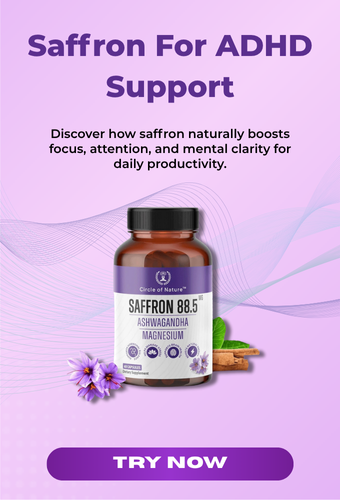The best saffron supplement for ADHD can provide natural support for attention and focus, offering hope for families seeking alternatives to traditional treatments.
Saffron, a golden spice from the Crocus flower, might be the answer. Recent studies show that saffron supplements can help improve focus, reduce hyperactivity, and support better emotional control in people with ADHD.
ADHD affects millions of people worldwide, and while traditional treatments are important, many families want to explore natural options too. The good news is that saffron supplements are showing real promise as a safe, natural way to support ADHD management.
What Makes Saffron Special for ADHD?
Saffron is packed with powerful compounds that help your brain work better. Scientists have discovered that saffron contains three main ingredients that make it so effective:
- Crocin gives saffron its beautiful golden color and acts like a protector for your brain cells. It helps improve mood and supports better attention span, which is exactly what people with ADHD need.
- Safranal is what gives saffron its unique smell and has natural calming properties. This can be especially helpful for people who struggle with hyperactivity and restlessness.
- Picrocrocin contributes to saffron’s taste and may help with cognitive function, supporting your ability to focus and pay attention for longer periods.
What Does the Science Say?
The research on saffron for ADHD is really promising. A comprehensive systematic review published in PubMed examined multiple clinical trials and found that saffron demonstrates an efficient role as either an adjuvant therapy to methylphenidate or as a single therapy for ADHD, without significant safety issues.
A major clinical study published in PMC compared saffron directly to methylphenidate (a common ADHD medication) and found that saffron and methylphenidate were both comparably effective for treating ADHD symptoms in children. The research showed that saffron is particularly good at helping with hyperactivity symptoms, while also supporting better attention.
Another landmark study published in the Journal of Child and Adolescent Psychopharmacology was a randomized, double-blind pilot study that provided evidence for satisfactory outcomes with saffron in treatment of ADHD. This study confirmed that saffron was as effective as methylphenidate in treating ADHD symptoms.
Research highlighted by Healthline found that 20–30 mg daily among children ages 6 years to 17 years was effective for symptoms of inattention and hyperactivity as soon as 3 weeks. Even better, saffron has fewer side effects compared to many traditional treatments.
What’s really impressive is that saffron doesn’t just help with one ADHD symptom – it helps with multiple areas including reducing hyperactivity, improving sustained attention, supporting emotional regulation, stabilizing mood, and promoting overall calmness.
Here is the comprehensive guide to choosing the best saffron supplement.
How Much Saffron Should You Take?
The research gives us clear guidelines on how much saffron works best for ADHD support:
- For Adults: Research published in ScienceDirect shows that most studies use 30-88.5mg daily of standardized saffron extract. One randomized, double-blind, placebo-controlled clinical trial used 15 mg twice daily (30mg total) with positive results. Higher potency formulas like Circle of Nature’s 88.5mg provide therapeutic levels in just one capsule.
- When to Take It: Saffron is best taken with meals to help your body absorb it better. You can take it in the morning for attention support throughout the day, or in the evening if your formula includes calming ingredients.
Is Saffron Safe?
One of the best things about saffron is how safe it is when used properly. A systematic review published in PubMed examining multiple clinical trials found that saffron showed “an efficient role as either an adjuvant therapy to MPH or a single therapy against ADHD, without significant safety issues.”
Another clinical study published in PubMed comparing saffron to methylphenidate found that “the frequency of adverse effects was similar between saffron and MPH groups,” meaning saffron was just as safe as the traditional medication.
Research published in PMC indicates that the safe dose range for clinical administration of saffron is 30-100 mg/day for chronic or sub-chronic use. Here are some important safety points to remember:
Don’t take more than 100mg daily, as higher doses aren’t necessary and could cause mild side effects. Always talk to your doctor before starting, especially if you’re already taking ADHD medications. Watch for any unusual reactions, though these are very rare. Pregnant and breastfeeding women should avoid saffron supplements.
Most people don’t experience any side effects at all. Occasionally, someone might feel slightly nauseous when first starting, but this usually goes away quickly.
Beyond ADHD: Extra Benefits of Saffron
Saffron doesn’t just help with ADHD symptoms – it offers several other benefits that can improve your overall quality of life:
Mood Support: Saffron is well-known for helping with depression and anxiety, which often occur alongside ADHD. The mood-stabilizing effects create a better foundation for attention and emotional control.
Read More About Best Saffron Supplement For Mood
Better Sleep: Many people with ADHD struggle with sleep problems. When saffron is combined with magnesium (like in Circle of Nature’s formula), it can help promote more restful sleep and better daytime calmness.
Read More About Magnesium Glycinate For Sleep
Stress Relief: Formulas that include ashwagandha along with saffron provide extra help with managing daily stress and environmental pressures that can make ADHD symptoms worse.
Read More About Saffron Supplement with Ashwagandha for Stress Relief
Common Questions About Saffron for ADHD
- Q: How long before I see results? Clinical research shows that most people start noticing improvements within 3 weeks, with full benefits appearing after 6-8 weeks of consistent use.
- Q: Can saffron replace my ADHD medication? Saffron should never replace prescribed medications without your doctor's approval. Research published in peer-reviewed journals shows it works best as additional support alongside your current treatment plan or as an alternative when appropriate and under medical supervision.
- Q: What's the difference between cooking saffron and supplements? While cooking saffron does contain beneficial compounds, the amounts are much smaller than what you get in a therapeutic supplement. Clinical studies use standardized saffron extracts that provide concentrated, standardized doses for consistent results.
- Q: Are there side effects? Research indicates that side effects are rare and usually mild. Some people might experience slight nausea when first starting, but this typically goes away quickly.
-
Q: Why Choose Circle of Nature for ADHD Support?
✓ Saffron extract 88.5mg high-potency standardized extract
✓ 3-in-1 formula with ashwagandha & magnesium
✓ Third-party tested for purity & potency
✓ Made in the USA with clean ingredients
✓ No fillers or binders
The Bottom Line
Saffron supplements represent an exciting natural option for ADHD support. The research shows real promise, and the safety profile is excellent when used appropriately. The best saffron supplements combine high-potency standardized extracts with complementary ingredients that address the full range of ADHD challenges.
If you’re considering saffron for ADHD support, look for products like Circle of Nature’s comprehensive formula that provide clinically studied amounts of saffron along with supportive ingredients like ashwagandha and magnesium. This approach gives you the best chance of experiencing meaningful improvements in attention, hyperactivity, and emotional regulation.
Remember, ADHD is a complex condition that benefits from a comprehensive approach. Saffron supplements can be a valuable part of your toolkit, but they work best when combined with proper medical care, healthy lifestyle choices, and other appropriate treatments.
Always consult with your healthcare provider before starting any new supplement, especially for ADHD management. With the right guidance and high-quality supplements, saffron could be the natural support you’ve been looking for to help manage ADHD symptoms and improve your quality of life.
This information is for educational purposes only and should not replace professional medical advice. ADHD requires proper diagnosis and treatment by qualified healthcare providers. Always consult with your healthcare team before making changes to your treatment plan.
You may also like

Best Saffron Supplement for Mood
In a world where mental health challenges are increasing, more people are

Best Saffron Supplements for Stress Relief and Calmness
In our increasingly stressful world, finding natural solutions for anxiety and emotional

Saffron Supplement: Why You Need Magnesium Glycinate & Ashwagandha Too?
In today’s high-pressure world, it’s no surprise that more people are turning



